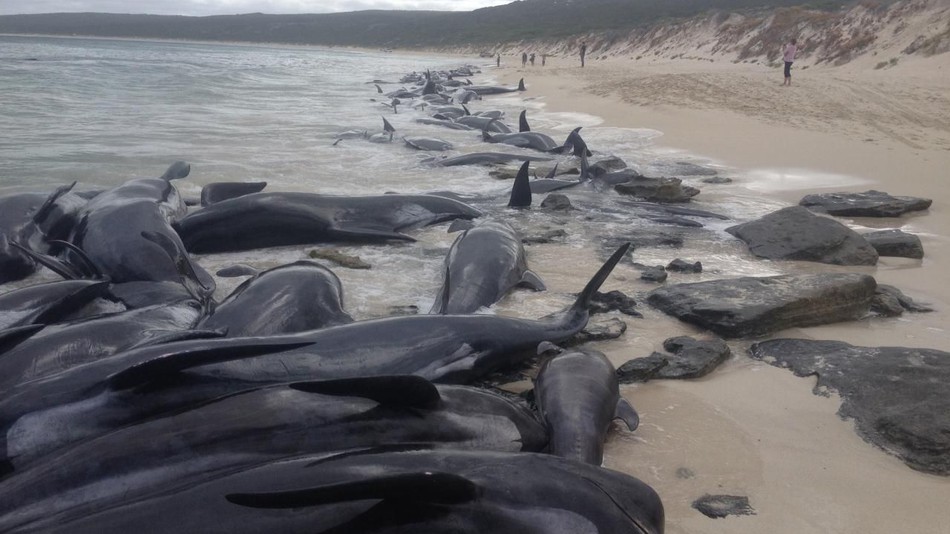More than 130 whales die on Western Australia beach
The stranding of 150 mammals at Hamelin Bay, south of Perth, sparks major rescue operation

A free daily email with the biggest news stories of the day – and the best features from TheWeek.com
You are now subscribed
Your newsletter sign-up was successful
At least 135 short-finned pilot whales have died following a mass beaching in Western Australia.
Around 150 short-finned pilot whales were spotted on the beach by a commercial fisherman on Friday morning at Hamelin Bay, around 195 miles south of Perth.
Almost all of them have now died, but volunteers and experts are attempting to save the remaining few. There’s a risk the carcasses will attract sharks and this has caused the authorities to issue warnings against swimming in the area, The Guardian reports.
The Week
Escape your echo chamber. Get the facts behind the news, plus analysis from multiple perspectives.

Sign up for The Week's Free Newsletters
From our morning news briefing to a weekly Good News Newsletter, get the best of The Week delivered directly to your inbox.
From our morning news briefing to a weekly Good News Newsletter, get the best of The Week delivered directly to your inbox.
“The strength of the animals and the windy and possibly wet weather conditions will affect when and where we attempt to move them out to sea,” said Jeremy Chick, an official from the Australian Department of Biodiversity, Conservation and Attractions. “The main objectives are to ensure the safety of staff and volunteers, as well as the whales’s greatest chance of survival.”
“Most of the whales beached themselves on dry land overnight and have not survived,” Chick added.
Melissa Lay, the manager at the Hamelin Bay Holiday Park, told Reuters that it was the second mass stranding she had witnessed during her 15 years in the area.
“There are some that are still alive but barely,” Lay said. “The last time it happened, none survived.”
A free daily email with the biggest news stories of the day – and the best features from TheWeek.com
Whale beachings are a rare but devastating event, the causes of which remain a mystery to scientists. Curtin University marine mammal scientist Bec Wellard told ABC News this week that “one of the theories we do have is that it could be a high risk area. The environment could be the cause of repeated strandings,” she said, adding that man-made noise, an illness within the whale group and naval activity could all be to blame.
-
 Epstein files topple law CEO, roil UK government
Epstein files topple law CEO, roil UK governmentSpeed Read Peter Mandelson, Britain’s former ambassador to the US, is caught up in the scandal
-
 Iran and US prepare to meet after skirmishes
Iran and US prepare to meet after skirmishesSpeed Read The incident comes amid heightened tensions in the Middle East
-
 Israel retrieves final hostage’s body from Gaza
Israel retrieves final hostage’s body from GazaSpeed Read The 24-year-old police officer was killed during the initial Hamas attack
-
 China’s Xi targets top general in growing purge
China’s Xi targets top general in growing purgeSpeed Read Zhang Youxia is being investigated over ‘grave violations’ of the law
-
 Panama and Canada are negotiating over a crucial copper mine
Panama and Canada are negotiating over a crucial copper mineIn the Spotlight Panama is set to make a final decision on the mine this summer
-
 Why Greenland’s natural resources are nearly impossible to mine
Why Greenland’s natural resources are nearly impossible to mineThe Explainer The country’s natural landscape makes the task extremely difficult
-
 Iran cuts internet as protests escalate
Iran cuts internet as protests escalateSpeed Reada Government buildings across the country have been set on fire
-
 US nabs ‘shadow’ tanker claimed by Russia
US nabs ‘shadow’ tanker claimed by RussiaSpeed Read The ship was one of two vessels seized by the US military


